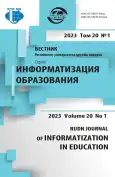The possibilities of an interactive multifunctional cloud portfolio for the individualization of education in primary school
- Authors: Masharova T.V.1, Kobeleva G.A.2, Skurikhina J.A.3
-
Affiliations:
- Moscow City University
- Institute of Educational Development of the Kirov Region
- Secondary School with the Profound Studying of Disciplines No. 66
- Issue: Vol 20, No 1 (2023)
- Pages: 41-51
- Section: DIGITAL EDUCATIONAL ENVIRONMENT
- URL: https://journal-vniispk.ru/2312-8631/article/view/321287
- DOI: https://doi.org/10.22363/2312-8631-2023-20-1-41-51
- EDN: https://elibrary.ru/BREKXH
- ID: 321287
Cite item
Full Text
Abstract
Problem statement . One of the priorities of the modern school is informatization and individualization of education. The implementation of these tasks can be facilitated by an electronic portfolio as a means for evaluating the individual educational results of students, optimizing work with information, and supporting the design of a non-linear structure for presenting materials in different formats. The research is aimed at studying the possibilities of an interactive multifunctional cloud portfolio for the individualization of education in a primary school. Methodology . Theoretical and methodological analysis and generalization of legal acts, literature on the application of information and communication technologies in education, processing of test results and electronic content of the portfolio are applied. Experimental work was carried out on the basis of Gymnasium No. 1 in Kirovo-Chepetsk. The experiment involved 52 students from grades 5-10 (girls - 52%, boys - 48%). Pearson’s chi-squared test for statistical data processing was used. Results . A model of an interactive multifunctional cloud portfolio has been developed for the individualization of education in a primary school. This model determines the structure of an interactive multifunctional cloud portfolio, including the sections “My individual educational route” (personal development of the student), “My lessons” (class activities), “My studios” (extracurricular activities), “My affairs” (educational work). The Google Classroom service was used to implement the model. Statistically significant differences in qualitative changes in the pedagogical system were revealed. Conclusion . The possibilities of an interactive multifunctional cloud portfolio for the individualization of education in a primary school are summarized: changing the nature of interaction between participants in educational relations; formation of universal educational activities, communication skills; personal development of students, etc.
About the authors
Tatyana V. Masharova
Moscow City University
Email: mtv203@mail.ru
ORCID iD: 0000-0001-5974-7748
Doctor of Education, Professor, Professor of the Department of Pedagogy, Institute of Pedagogy and Psychology of Education
4 Vtoroy Selskohoziajstvenny Proezd, Moscow, 129226, Russian FederationGalina A. Kobeleva
Institute of Educational Development of the Kirov Region
Author for correspondence.
Email: ga.kobeleva@kirovipk.ru
ORCID iD: 0000-0001-8099-7792
Head of the Department of Education Management
23 Erdyakova St, bldg 2, Kirov, 610033, Russian FederationJulia A. Skurikhina
Secondary School with the Profound Studying of Disciplines No. 66
Email: 89058709025@yandex.ru
ORCID iD: 0000-0002-3040-2655
Deputy Director
14 Oparina St, Kirov, 610008, Russian FederationReferences
- Hase A, Kahnbach L, Kuhl P, Lehr D. To use or not to use learning data: a survey study to explain German primary school teachers’ usage of data from digital learning platforms for purposes of individualization. Frontiers in Education. 2022;7. http://doi.org/10.3389/feduc.2022.920498
- Shirokov YA, Tikhnenko VG. Analysis of the problems of training bachelors in the direction of “Technosphere security” taking into account the cognitive characteristics of new generations of students. Journal of Higher Education Theory and Practice. 2022;2(9):68-76. http://doi.org/10.33423/jhetp.v22i9.5362
- Gani A, Zulaikhah S. The effectiveness of team assisted individualization learning model using the sociodrama method in increasing the concept of mastery ability in Islamic education learning. International Journal of Society, Culture and Language. 2022;10(2):125-136. http://doi.org/10.22034/ijscl.2021.247369
- Huang Y. Design of personalised English distance teaching platform based on artificial intelligence. Journal of Information and Knowledge Management. 2022;21. http://doi.org/10.1142/S0219649222400172
- Savvinov VM, Ivanov PP, Strekalovsky VN. Methods and principles of assessing the digital maturity of educational institutions. Bulletin of the Northeastern Federal University named after M.K. Ammosov. Series: Pedagogy. Psychology. Philosophy. 2021;(2):28-40.
- Frolova EV, Rogach OV. Digital technologies as a factor in increasing the competitiveness of educational services in the context of the spread of online learning. Informatics and Education. 2022;37(3):46-54. http://doi.org/10.32517/0234-0453-2022-37-3-46-54
- Stepanov SY, Orzhekovskiy PA. Individualization and digitalization of creative development of students in chemistry lessons. Acta Biomedica Scientifica. 2022;7(2):212-222. http://doi.org/10.29413/ABS.2022-7.2.22
- Soboleva EV, Zhumakulov KK, Umurkulov KP. Developing a personalised learning model based on interactive novels to improve the quality of mathematics education. Eurasia Journal of Mathematics, Science and Technology Education. 2022;18(2):2078. http://doi.org/10.29333/EJMSTE/11590
- Derkachev PV, Zinkovskiy KV, Kravchenko IA, Semenova KA. “Economy of scale” or “economy of scope”: what universities should rely on in the competitive struggle? University Management: Practice and Analysis. 2021;25(1):131-141. http://doi.org/10.15826/umpa.2021.01.010
- Smolyaninova OG, Bezyzvestnykh EA. Professional training of teacher 4.0: developing digital competency by means of ePortfolio. Journal of Siberian Federal University. Humanities and Social Sciences. 2019;12(9):1714-1732. http://doi.org/10.17516/1997-1370-0478.
- Fedorov AI, Sivokhin IP, Ogienko NA, Avsievich VN. Organization of project work of physical education university students in information-intensive learning environment. Theory and Practice of Physical Culture. 2018;9:88.
- Imanova OA. Mastering the technology of electronic portfolio by future teachers-tutors in the conditions of distance learning. Informatics and Education. 2021;(7):46-53. http://doi.org/10.32517/0234-0453-2021-36-7-46-53
- Putilovskaya TS, Zubareva EV, Tuchkova IG. Psychological and professional readiness for applying e-portfolio in the digital educational environment of universities. Vestnik Universiteta. 2022;(4):176-182. http://doi.org/10.26425/1816-4277-2022-4-176-182
- Gerasimova EK, Zorin SL, Kobeleva GA, Mamaeva EA. Designing a personalized educational model while working with digital technologies. Perspectives of Science and Education. 2020;47(5):398-412. http://doi.org/10.32744/pse.2020.5.28
- Suvorova TN, Mikhlyakova EA. Application of 3D modeling technologies for personalization of training. Scientific and Methodological Electronic Journal Concept. 2020;(5):110-129. http://doi.org/10.24411/2304-120X-2020-11038
Supplementary files









